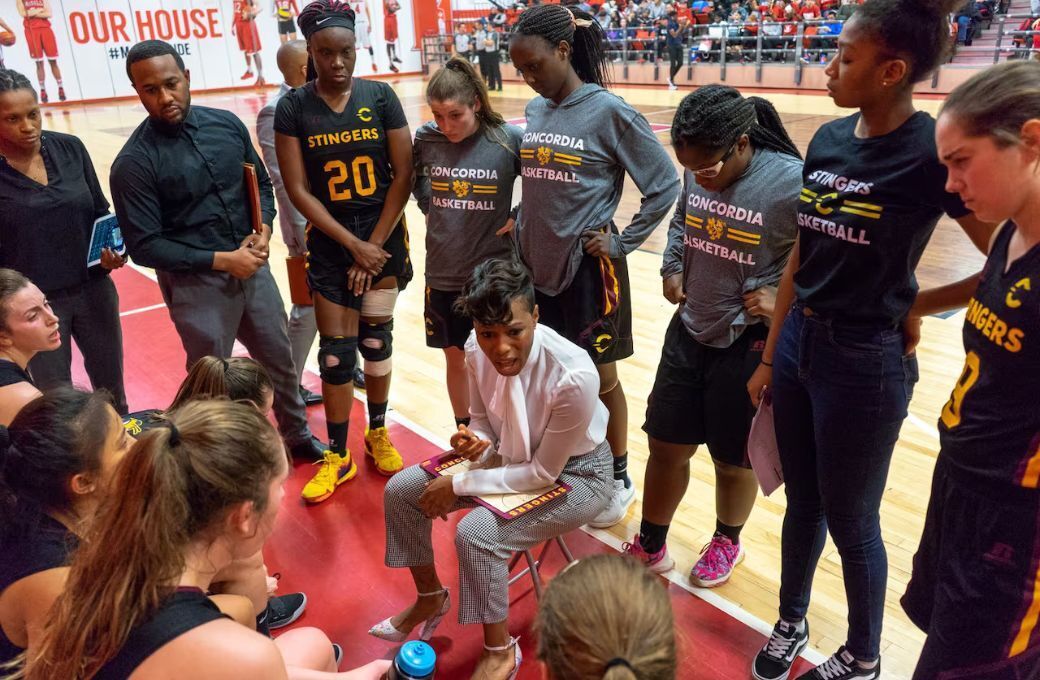Le 8 Ultime - Féminin
Kyanna Giles de Winnipeg et Aiden Warnholtz de Carleton sont les joueurs de la semaine du basketball de U SPORTS


Notre équipe n'a pas encore traduit cet article en Français.
Voir l'article original en Anglais.
Laura Marchand, CBC News

Serena Tchida had heard of Tenicha Gittens long before the woman became her coach.
As the coach of the Concordia Stingers women's basketball team, Gittens had a reputation for being intense. But Tchida only met her when Gittens came to watch one of her basketball games at CEGEP Édouard-Montpetit — and on the court, Tchida got hurt.
"She took care of me, brought me to Concordia to get my surgery and my rehab," Tchida recalled.
Tchida wasn't yet one of Gittens's players, but she says that experience cemented where — and for whom — she wanted to play.
"It was the first time I'd seen a Black woman in that position, and she was killing it," Tchida said. "We're not really seen, but I felt seen with her."
As one of the few Black women coaching in Canada, Gittens says she's very aware of how she presents herself, both to her team and on the court.
"It makes me very mindful of how I walk into a room, how I dress and how I look, you know, and that confidence and that power that I exude," she said. "It's not about me, it's about the ones that look like me.
When Gittens herself was a player, she, too, had a Black female coach. She said that experience showed her coaching was a path that she could take.
"It's one thing to have somebody that doesn't look like you say, 'Yes, you can get there.' It's another thing to have someone that does look like you that says: 'You can be, and I'm going to tell you exactly how.'"
That's the message she is now trying to pass along to her players.
But her style of coaching doesn't end courtside.
Gittens said on any given day, she's also an auntie, an older sister, a confidante and a psychologist.
"We have to be everything to these young people. What you see on the court on game day — that's the easiest part of my job."
Ian Harrison, who works with Concordia's communications team, nominated Gittens as a Changemaker. He said it's easy to see her commitment to her players.
During the pandemic, the team had to switch to early-morning outdoor practices to comply with COVID-19 restrictions. When Gittens realized that many of her players weren't eating properly, she began making them breakfast before practice, said Harrison.
"She's that kind of coach. She goes above and beyond to make sure students are well nourished or that their mental health is taken care of," he said.
Gittens said she wishes her players' nutritional needs weren't something she had to worry about. At their age, she was playing college basketball in the U.S., and she said there's a stark difference between her experience there and what she sees here.
"We were on full scholarships. I had a meal plan. I had a dorm and all that. All I had to worry about was being the best student and athlete that I had to be," she said.
She said even the few Stingers who are on scholarship still have to pay for their accommodation and meals. Many are juggling academics, their sport and part-time work, in addition to their social and home lives.
Gittens said that while Quebec has a lot of top-level talent, many of the best players leave the province, like she did, because it's hard to be an athlete here.
"If we want to produce the best, we have to make it a little bit easier for them, for athletes," she said.
Le 8 Ultime - Féminin
L’équipe U SPORTS
